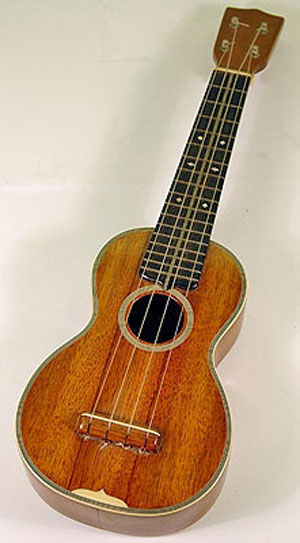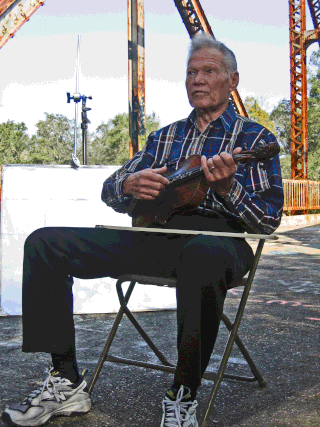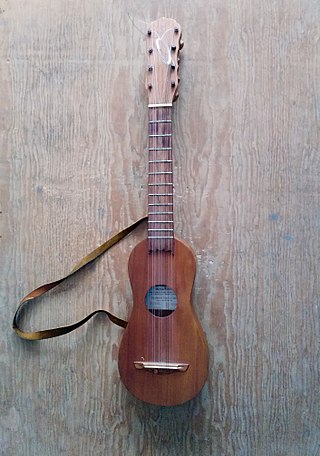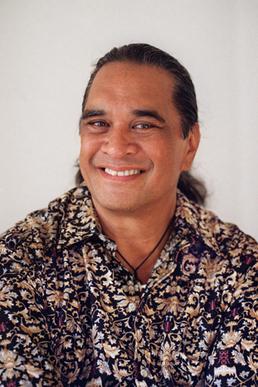
The ukulele, also called a uke, is a member of the lute family of instruments of Portuguese origin and popularized in Hawaii. It generally employs four nylon strings.
The music of Hawaii includes an array of traditional and popular styles, ranging from native Hawaiian folk music to modern rock and hip hop. Styles like slack-key guitar are well known worldwide, while Hawaiian-tinged music is a frequent part of Hollywood soundtracks. Hawaii also made a contribution to country music with the introduction of the steel guitar. In addition, the music which began to be played by Puerto Ricans in Hawaii in the early 1900s is called cachi cachi music, on the islands of Hawaii.
Norman L. Blake is a traditional American stringed instrument artist and songwriter. He is half of the eponymous Norman & Nancy Blake band with his wife, Nancy Blake.

Charles Samuel Bush is an American mandolinist who is considered an originator of progressive bluegrass music. In 2020, he was inducted into the International Bluegrass Music Hall of Fame as a member of New Grass Revival. He was inducted into the Hall of Fame a second time in 2023 as a solo artist.

Vassar Carlton Clements was an American jazz, swing, and bluegrass fiddler. Clements has been dubbed the Father of Hillbilly Jazz, an improvisational style that blends and borrows from swing, hot jazz, and bluegrass along with roots also in country and other musical traditions.
Edward Leilani "Eddie" Kamae was one of the founding members of Sons of Hawaii. He was a 'ukulele virtuoso, singer, composer, film producer and primary proponent of the Hawaiian Cultural Renaissance.
Imua Garza is a Grammy Award nominated producer, vocalist, musician, recording engineer and composer. His first official professional music release was around the age of 11. He then went on to record and perform with the ukulele group Opihi Pickers.

The jarana jarocha is a guitar-shaped fretted stringed instrument from the southern region of the state of Veracruz, Mexico. Typically strung with 8 strings in 5 courses, usually arranged in two single outer strings with three double-courses in between. The strings are usually nylon, although they were gut in the past. The body is somewhat narrower than a guitar because of its direct lineage from the Spanish baroque guitar of the sixteenth century. Sometimes mistaken for a ukulele, the jarana jarocha comes in at least five sizes, the smallest being the chaquiste, somewhat smaller than a soprano ukulele; then the mosquito, about the size of a soprano ukulele; the 'primera', about the size of a concert ukulele; the 'segunda', in length between a tenor and a baritone ukulele; and the 'tercera', somewhat longer than the baritone ukulele. Some luthiers are building jaranas of a size they label "tercerola" or "jarana cuarta", but there is some discussion as to whether these represent a distinct size or are merely particularly large variations of the standard tercera.
Flying Fish Records was a record label founded in Chicago in 1974 that specialized in folk, blues, and country music. In the 1990s the label was sold to Rounder Records.

Wilfred Nalani "Moe" Keale was an American musician of Hawaiian music, a ukulele virtuoso, and an actor. He was the uncle and major musical influence of Israel Kamakawiwoʻole.

William Tapia, known as "Uncle Bill" and "Tappy", was an American musician, born to Portuguese parents. At age 8, Tapia was already a professional musician, playing "Stars and Stripes Forever" for World War I troops in Hawaii.

Rickie Lee Skaggs, known professionally as Ricky Skaggs, is an American neotraditional country and bluegrass singer, musician, producer, and composer. He primarily plays mandolin; however, he also plays fiddle, guitar, mandocaster, and banjo.

Elderly Instruments is a musical instrument retailer in Lansing, Michigan, United States, with a reputation as a "megastore", a repair shop and a locus for folk music including bluegrass and "twang". Specializing in fretted instruments, including acoustic and electric guitars, banjos, mandolins, and ukuleles, Elderly maintains a selection of odd or rare instruments. Elderly is known as a premier repair shop for fretted instruments, as one of the larger vintage instrument dealers in the United States, and as a major dealer of Martin guitars in particular.

Kamaka Hawaii, Incorporated, also known as Kamaka Ukulele or just Kamaka is a family-owned Hawaii-based maker of ukuleles. It is often credited with producing some of the world's finest ukuleles, and created the first pineapple ukulele. The company manufactures 9 types of ukulele.

Holly Happy Days is the 12th studio album and first holiday album by Indigo Girls, released on October 12, 2010 by Vanguard Records. It is their third album on the IGR/Vanguard imprint.

Tim Weed is a multi-instrumentalist singer-songwriter known for virtuosity on the banjo. Raised a Southern California surfer, Weed learned the banjo at age 17 and played professionally at 18. He was in various bands and he worked as a studio musician singing and playing electric guitar in the Greater Los Angeles Area. He lived in Japan for a time producing records for Sony-Epic, and he lived on the island of Maui where he rediscovered the banjo. Weed settled in Tucson, Arizona, for eight years, playing in local bands. Working with luthier Dennis Coon he designed and built a seven-string hybrid of banjo and guitar called the "Sevan". He released a solo banjo album: Milagros; in mid-2005 the music was featured on NPR. In 2008 Weed moved to Northern California where he released an album of Americana, world music and bluegrass songs: Soul House. In 2020 he released a classical album, Light and Dark, with the Prague Metropolitan Orchestra. Weed plays concerts and festivals, and he teaches banjo privately.
Joseph Allen Carr was an American country and roots musician, author, and professor originally from Denton, Texas. Self-taught, he began playing first folk music and later old-time and bluegrass music on guitar at age 13 and mandolin at age 15. After performing with local Texas bands Roanoke in the 1970s and Country Gazette in the 1970s and 80s, Carr formed a "Bob Wills style" Western swing band, Joe Carr & the Texas Lone Star Band, in 1987. Beginning in 1984, he taught at the commercial music program at South Plains College in Levelland, Texas, For the last several years of his life, he was in charge of the bluegrass and Western swing departments at the college and was the director of Camp Bluegrass held there annually
Jo Dusepo, better known simply as Dusepo, is a luthier, multi-instrumentalist musician, ethnomusicologist, composer, radio host, sound engineer and producer from London, England. Since November 2014, she has also been a radio host on K2K Radio in Kilburn, west London.
Charles Sawtelle was an American bluegrass musician and a member of the band Hot Rize. Sawtelle died on March 20, 1999, from leukaemia.

Following its invention and development in Italy the mandolin spread throughout the European continent. The instrument was primarily used in a classical tradition with mandolin orchestras, so called Estudiantinas or in Germany Zupforchestern, appearing in many cities. Following this continental popularity of the mandolin family, local traditions appeared outside Europe in the Americas and in Japan. Travelling mandolin virtuosi like Carlo Curti, Giuseppe Pettine, Raffaele Calace and Silvio Ranieri contributed to the mandolin becoming a "fad" instrument in the early 20th century. This "mandolin craze" was fading by the 1930s, but just as this practice was falling into disuse, the mandolin found a new niche in American country, old-time music, bluegrass and folk music. More recently, the Baroque and Classical mandolin repertory and styles have benefited from the raised awareness of and interest in Early music.














